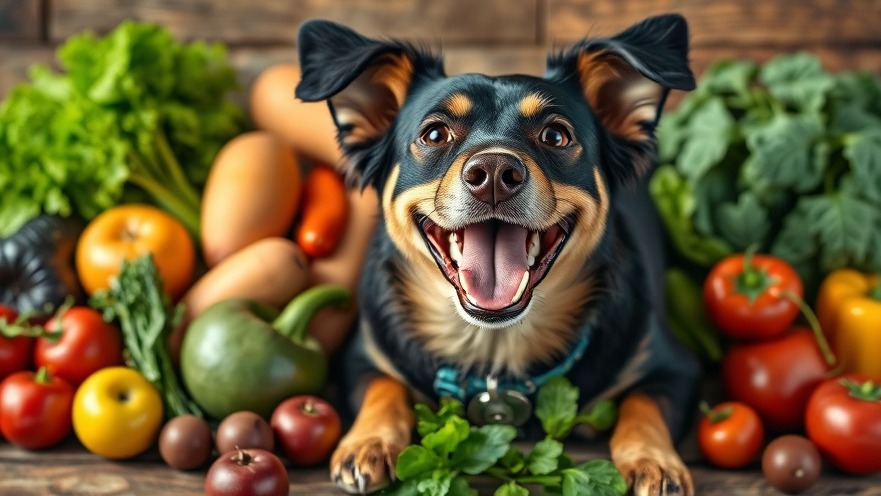
Unlocking the Secrets of Your Dog's Gut Health
A healthy gut is not just a trend in pet care; it’s a fundamental aspect of overall canine wellness. As devoted pet owners, we want what's best for our furry pals, and understanding the digestive system is key to ensuring a joyful and long life for our dogs. Prebiotic-rich foods play a critical role in this process, providing essential nutrients that fuel beneficial gut bacteria. When dogs have a balanced gut microflora, it not only enhances digestion but also boosts the immune system and can even affect mood and anxiety levels.
Seven Game-Changing Prebiotic Foods for Dogs
Here’s a closer look at seven dog-safe foods that are rich in prebiotics and are sure to keep your pup's digestive system humming.
Pumpkin: Nature’s Digestive Helper
Often touted as a wellness champion, pumpkin is an excellent source of prebiotic fiber. This soluble fiber nourishes the good bacteria in your dog’s gut, aiding digestion and regulating bowel movements. A spoonful of plain canned pumpkin—free from sugars or spices—can be a delightful addition to your dog's meals. To start, mix a small amount into their food and gradually increase as their stomach adjusts.
Carrots: Crunchy and Wholesome
Not just a crunchy snack, carrots are packed with pectin, a soluble fiber that promotes better digestion. Whether served raw or steamed, carrots can offer a low-calorie, nutritious treat for your dog. You can also find innovative meal toppers that include ingredients like carrots combined with proteins, enhancing both meal flavor and digestive benefits.
Blueberries: Tiny Superfoods for Big Health Upgrades
Rich in antioxidants and prebiotic properties, blueberries can make an excellent treat or meal additive for dogs. Their soluble fiber content supports the growth of healthy gut bacteria. Serve them fresh or frozen, adding a pop of flavor to meals or as a stand-alone treat that’s sure to get tails wagging.
Apples: Sweet and Nutritious Treats
Apples, particularly the skin, are loaded with pectin, serving as another potent prebiotic. Just remember to remove the seeds and core since they can be harmful to dogs. Offering apple slices as a treat or incorporating them into meals can add a refreshing sweetness without sugar pitfalls.
Chicory Root: A Hidden Prebiotic Gem
Although not commonly found in grocery stores, chicory root is a powerhouse for gut health. Its inulin content works wonders for feeding beneficial bacteria like bifidobacteria. Many high-quality dog supplements and foods include chicory root, so be on the lookout for these ingredients when shopping for your pet’s health.
Flaxseed: The Fiber and Omega-3 Boost
Flaxseed is a dual threat when it comes to supporting canine health: it contains both soluble fiber and omega-3 fatty acids. While the fiber acts as a prebiotic, omega-3s help reduce gut inflammation and promote overall better health. Ground flaxseed is easier for dogs to digest and can be included in meals for an effective gut health strategy.
Bone Broth: Nourishing Digestion
While not a traditional prebiotic, bone broth is excellent for supporting digestive health. It’s rich in nutrients that help nourish the gut lining and reduce inflammation. Adding bone broth into your dog's diet can ensure efficient digestive function, thereby fostering a healthy bacterial balance.
Understanding the Importance of Prebiotics
The inclusion of these prebiotic-rich foods in your dog’s diet is not merely a passing fad but a crucial element of modern pet nutrition. They contribute to overall health by enhancing digestion, promoting healthy gut bacteria, and supporting the immune system.
Real-Life Impacts of Gut Health on Canines
A growing body of research highlights the connection between gut health and behavior. For instance, a study indicated that dogs with balanced gut flora exhibit lower levels of anxiety and stress. This underscores the importance of nutrition in behavioral health.
Making Simple Dietary Changes for Your Pup
Implementing these prebiotic-rich foods into your dog's diet can lead to significant health improvements. Gradually introduce new foods to monitor for any adverse reactions, and consult with a veterinarian before making drastic dietary changes.
The Future of Canine Nutrition
As we learn more about the gut-brain connection and the impact of microbiomes on overall health, it is evident that focusing on diet is vital for pet owners. The trend is shifting towards more natural dietary supplements that enhance gut health, paving the way for happier, healthier dogs.
In conclusion, emphasizing prebiotic-rich foods and understanding their benefits can significantly improve your dog’s overall health and happiness. Start watching for these seven foods next time you’re shopping for your furry friend!
 Add Row
Add Row  Add
Add 




Write A Comment